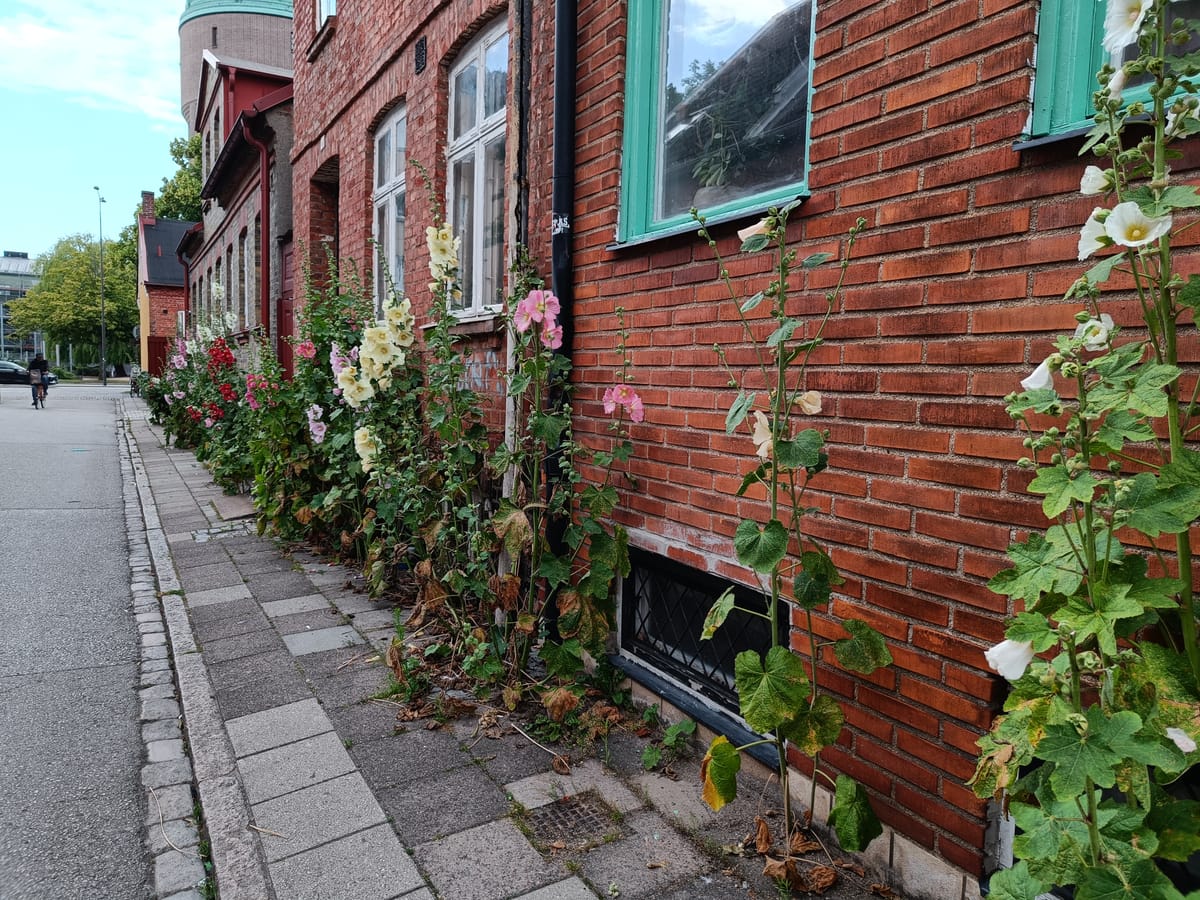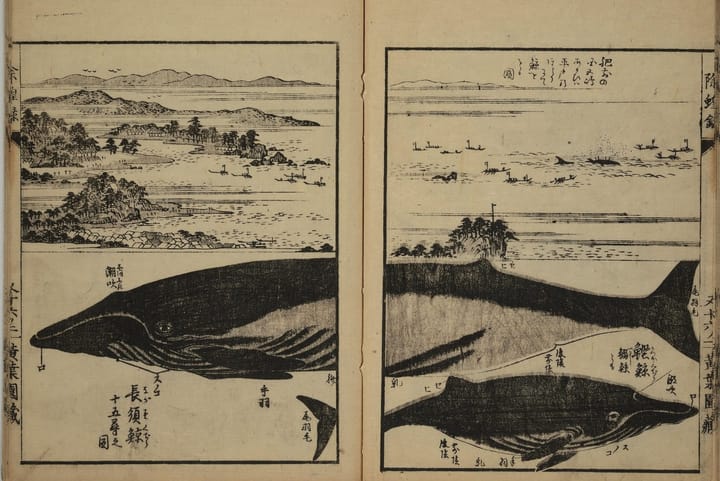week 26 / 2025
The hollyhocks stretch toward the sun, and WEEKNOTES wanders the backstreets to bask in their colours... This week, a fictional bishop transmigrates, and the Green Revolution is reassessed.

“Things aren’t what they were / they’re what they are / there’s no time of our own... / ...and the WEEKNOTES you know / is the only one”
Welcome back to WEEKNOTES at Worldbuilding Agency, where I’m choosing to interpret the deafening silence from you lot in reader-land as tacit approval of last week’s restructuring of the format. So let’s go go go…
Summer seems to have arrived properly in Malmö at last. Despite a fair few flurries of rain (and the inevitable wind), there’s been plenty of blue skies and temperatures in the mid-20s, which is very much my climatic jam.
Nothing quite symbolises summer in Malmö for me like stockrosor, known in English as hollyhocks. I’m sure I must have encountered them in the UK at some point in my life—if nothing else, my mother must surely have had some in one or other of her gardens?—but they never really impacted on my consciousness until I moved here. That they did so should come as no huge surprise, because they grow along the seams where houses and apartment blocks meet pavements all across the city (as shown above). By the end of June they’ve sprung up taller than I am, and started putting out their colourful flowers; sometimes they’re still doing it when September rolls round, provided they haven’t become parched, or snapped off by passers-by.
I’ve never been much of one for flowers, and maybe it’s just the way they coincide with my favourite season, but I adore stockrosor, and often find myself taking longer routes than I need to, just so I will walk past more of them. Perhaps the connection to walking strengthens the appeal? Malmö’s size and walkability are a big part of why I fell so hard for the place immediately on arrival, and I’m not yet bored of just wandering around the town without particular purpose when time and weather permit.
This summer, however, I intend to make more of an effort to get out of town and wander the countryside. This will hopefully serve as a good complement to the work I have planned for the season, which is for the most part long-form writing of one sort or another. Much has been made of the connection between writing (and thinking) with walking, and while I’ve always liked to walk, I’ve never really noticed it affecting my work one way or the other. So now I plan to see what happens when I pay more attention to it…
reading
I put off reading the late novels of Philip K Dick for a long time due to what I recognise in hindsight as inherited skiffy prejudice.
To make a sweeping generalisation, sf fandom’s take on Dick is that the stuff in the middle is the good stuff: y’know, after he’d gotten past the pulpy “write a novel over the weekend to make the rent” early phase and learned his chops, but before he went crazy. The tacit assumption is that the work that emerged after “2-3-74” are sad testaments to a mind broken by drugs, paranoia, grief and religion, admirable only for the fact of their having been written at all under such difficult circumstances.
As usual, the fandom narrative is half right. The late Dick novels are testaments of a mind broken by drugs, paranoia, grief and religion, rather than testaments to it; they’re also evidence of a protracted attempt to wrestle with the same questions that Dick had always been asking about reality and perception and belief, but to do so with ever fewer tropes from the generic toybox.
The late Dick novels are also sad, but not because they represent a wasted or destroyed talent; they’re sad because they show the workings of a mind brilliant enough to understand its own misalignment with the world in which it found itself. They’re sad because they are written by someone who understood himself to be living in a fallen cosmos, and who just about manages to get his characters to a point of coming to terms with that fallenness, even though he could never quite bring himself to the same point.
All of which is to say: this week I finally read The Transmigration of Timothy Archer, and it broke my heart—partly because it’s a story about the impossibility of reconciling rationality and faith in an over-intellectualised and de-sacralised world (though in that sense it does feel alarmingly timely, as well as heartbreaking), of course, but also because it’s so brilliantly written.
Dick had always longed to publish straight novels, and blundered into sf as much for the necessity of quick paydays for pulp product as for anything else. Here, in his last finished book (though not, I think, his last published book?), he really did it—shook off the skiffy scaffold entirely, and managed to cram all the philosophical doubt and angst of his earlier work into a straight but tragic tale, narrated by a character you’ll believe in right from the first paragraph, which reads as follows:
Barefoot conducts his seminars on his houseboat in Sausalito. It costs a hundred dollars to find out why we are on this Earth. You also get a sandwich, but I wasn’t hungry that day. John Lennon had just been killed and I think I know why we are on this Earth; it’s to find out that what you love the most will be taken away from you, probably due to an error in high places rather than by design.
The whole damn book is right there in that first paragraph, all the beauty and mundanity and sorrow of it. I hope it goes without saying that the very saddest thing about Dick’s demise is the simple fact of it. But the second saddest thing is that we lost the chance to read more novels that dealt so bravely yet so delicately with the yawning epistemic abyss of modernity.
a clipping
This week’s clipping is a two-book review at The New Yorker, in which both the “Green Revolution” of the late C20th and the daft parade of technological “solutions” intended simultaneously to fix and extend it come off looking pretty bad. I will take the risk of quoting the closing paragraph rather than the opener, if only because none of the other paragraphs work in isolation; this is the point that every part builds toward.
In the eighty years since Borlaug arrived in Mexico, farming in much of the world has been transformed. New tools that could make farms even more productive are constantly being developed—from CRISPR to remote-sensing drones and weeding machines that shoot out lasers. At the same time, the world, too, has been transformed, by such things as climate change, groundwater depletion, and soil contamination. The new tools and the new threats are bound up in each other—two sides, as it were, of the same leaf. If it is reasonable to imagine that we will, somehow or other, find ways to feed ten billion people, it is also reasonable to fear how much damage will be done in the process.
I’m increasingly of the view that adaptation is the only game in town when it comes to climate change. That’s not to say that I intend to stop agitating for the infrastructural reconfiguration that would be necessary to head off the worst outcomes; nor is it to say that I think “we’re doomed”. But it is to say that I cannot see any realistic route to a top-down, politically-determined attempt at economic transformation, and that I judge the tech-solutionist paradigm, however well-intentioned, capable only of making things worse in “innovative” and therefore amok ways.
Change, when it comes—and it will come eventually, because the context will require it—will come from below. It will be local, and it will work with its eyes open, making use of what’s nearest to hand. Human beings survived an entire ice age without any technologies more advanced than story and stone tools, and it was arguably the making of them. Perhaps the heat to come will be their (re)making.
ticked off
An unusually simple slate this week:
- Twenty-nine hours on PROJECT PORTON. (It’s been crunch week on the big main deliverable for PORTON, and I’m both pleased and proud to say we got it in to spec and to deadline, having also hit every previous deadline in a long, complex project whose deadlines were the highest entry on the risk-assessment list we put together at its start. Teamwork at its best: effective and satisfying.)
- Three hours admyn.
- Ten hours undirected writing and reading, som vanligt.
kinmaking
No kinmaking this week, unless you choose to count my visit with the dental hygienist—and I would rather not think of that in any terms other than those of ugly and uncomfortable necessity.
And that’s that, then. I hope that things are good with you, whoever you are and wherever you may be.
This has been the Worldbuilding Agency weeknotes for Week 26 of 2025. Thanks for reading! If you've enjoyed them, it's free to subscribe. If you are already subscribed, please send to a friend who you think might also like it!





Comments ()